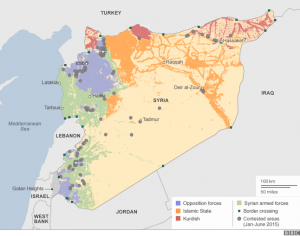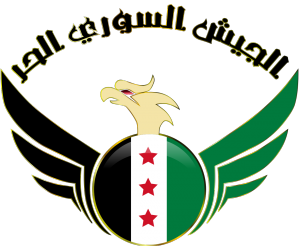Who:
- Defectors from the Syrian Army and civilian militias (Moderate in comparison to other Syrian Rebel Groups—Seeking a secular democracy)
- Multiple brigades/factions affiliated with the Supreme Military Council (SMC)
- Loose command structure due to these multiple brigades/factions
- 2011: 15,000-200,000 members in the FSA
- 2015: Approximately 70,000 members in the FSA
Overview:
- A civilian-military council that originated in Turkey during August of 2011
- These brigades/factions fight on the five “fronts” of Syria:
Priorities:
- To overthrow President Assad
- Create a new Islamic state
- Different brigades have divided priorities including: Community support, unifying certain brigades within the FSA, calling for an Islamic state governed by civilians, and to create a more civil state that includes all ethnicities and social identities.
Support:
- United States (Non-lethal and Lethal support)
- EU
- Saudi Arabia (Financial)
- Turkey (Financial)
- Qatar (Financial)
- Supported by Sunni population
Political Associations:
- National Coalition for Syrian Revolutionary and Opposition Forces
- Syrian National Council
- Support of 130 Nations total
Criticisms:
- Accused of war crimes
- Command structure is so loose making the FSA less effective then it could be
- Some brigades/factions of the FSA are extremists
- Many weapons given to ISIL(ISIS) came from the FSA
- Opposition against the FSA, particularly Russia and Iran, believe the FSA is causing unnecessary bloodshed and could potentially be linked to extremist rebel groups causing terrorism.

http://www.bbc.com/news/world-middle-east-24403003
http://www.bbc.com/news/world-middle-east-15563900
http://www.bbc.com/news/uk-scotland-scotland-politics-34962630
http://ichef-1.bbci.co.uk/news/976/cpsprodpb/6A83/production/_84176272_syria_control_976map_v10.png
